Recent SUP racing headlines suggest a sport in crisis. In June, Detroit-area racers were crushed when their beloved OABI race—named after the 6.5-mile, Once-Around-Belle-Isle circuit—was called off with less than two months notice. The six-year-old summer beach party with live music drew about 200 racers a year and was the picture of a regional race done right. But the businesses behind it wanted to pull out and find a buyer, according to Harrison Withers, one of the local paddlers who tried unsuccessfully to take over the event.
In March, the venerable Pacific Paddle Games (PPG) in Dana Point, California, one of the top three races on the pro circuit, was abruptly canceled—well, officially postponed—until at least 2020. This was SUP racing’s flagship, whose predecessor, the Battle of the Paddle, fostered the sport from 2008 to 2014. The PPG had seen declining participation, and last spring American Media Inc. bought the PPG’s organizer, SUP The Mag, along with several sister publications. The new ownership swiftly axed the event, with rumors attributing the decision to lackluster profits.
Meanwhile, on the international stage, SUP has a shot at inclusion in the 2024 or 2028 Olympics. This breakout is overshadowed by an ongoing feud over whether the governing body of canoeing or surfing should represent the sport.
Fortunately, these bleak stories say more about what happens when profit and politics mix than anything about SUP racing overall. The competitive spirit of SUP is alive and well, with new races starting up and standout events selling out faster than ever. Plus, a change to the worldwide racer rankings could provide new recognition and motivation for amateur racers.
SUP Racer, the online publication launching the Paddle League World Rankings back in 2013, announced a major revamp last summer. Starting in 2020, it will amend the ranking system to include hundreds of smaller races and more than 3,000 paddlers—encompassing most of the world’s enthusiasts.
“It’ll include all tours, leagues, series and federations that meet a minimum threshold,” says publisher Christopher Parker.
Amateurs can expect to see their names listed alongside the pros, a potential motivator for the masses, according to Parker, who says the fact amateurs and pros compete side-by-side makes SUP, “like the Boston Marathon of the ocean.”
Of course, SUP has a long way to go to match marathon running’s popularity. The Outdoor Industry Association recently reported 3.5 million people paddleboarding in the U.S.—a country with 60 million runners. Fewer than half of those paddlers own a board, and they average 6.3 paddling days a year. The subset training regularly and racing is a tiny percentage.
Organizing SUP races drawing only tens or hundreds of entrants is a labor of love by volunteers and organizers with day jobs, clearly not for businesses looking to make a tidy profit. But the grassroots still rocks. Plenty of dedicated individuals run local races just because they are racers themselves who want to give something back, or create more of what they love in the world. Athletes like John Batson, a medical doctor who started the Low Country Boil Paddle Battle this year in his home of Hilton Head Island, South Carolina. There were some hiccups, including Hurricane Dorian causing the race to be postponed by a week.
SUP is an artificial distinction; it’s just a family of paddlers. “Still, everything went great and we had 70 competitors,” said Batson. “Not bad for a first go-round.” His recipe for success combined, “Low entry fee, good race shirts, and meaningful trophies,”—like Olukai sandals and local art. “There is no reason a place like this should not have a world-class paddle race.” Olukai is now signed on as a title sponsor for 2020.
Referencing OABI’s demise, “I think we are seeing a shift towards more events on the calendar as communities try to cater to their local markets,” says Derek Schrotter, organizer of the Eastern Canadian SUP Championships as well as a weekly race series in southern Ontario. “These mid- to large-size events seem to be in contraction while smaller grassroots programs are growing.”
If numbers at races like the PPG are declining, participants may not be dropping out of the sport, just moving on to fresh events like Batson’s, or ticking off bucket-list races like the 444-mile Yukon River Quest—which sold out in a record 12 hours this year—or the 31-mile Chattajack race down the Tennessee River in Chattanooga. All of these are multi-class paddle races, open to everything from recreational canoes to surf skis. No matter what you paddle, you’re embraced by the community. SUP is an artificial distinction; it’s just a family of paddlers. Racers come back year after year and shift between boat classes, says Batson.
Race director Ben Friberg has seen Chattajack grow from 30 racers in 2012—mostly friends and friends of friends—to 650 today, and the sell-out time roughly halves each year. Last May, despite opening online at midnight, Chattajack filled up in six hours and amassed a waitlist of 200. People come for the spectacular Tennessee River Gorge location and a vibe catering to the experience of what Friberg calls “the blue-collar paddler,” someone with a day job and who trains five days a week to compete with their friends.
“We focus on creating a fun race experience for people. I want it to be a family reunion, but at the same time, I want it to be where people are going to push themselves,” says Friberg. “We drive one another to be healthier, eat cleaner, train smarter… All this equates to creating stoke.”
If stoke came in a bottle, its eternal source would be the weekly race series in towns and cities like Oakville, Ontario, where Schrotter’s Tuesday Night Race League draws 30 or 40 paddlers a week. Like Friberg, Schrotter sums up success in one word, an intangible spirit that fades away when an event becomes a commercial endeavor: fun.
Maybe SUP Racer’s online World Rankings will propel even more interest in the sport, when everyday paddlers can battle their way up the global leaderboard, but “personally as a racer, I do not care about World Rankings or things like that,” says Schrotter. “The 30-40 minutes of a race is the least important part. The sense of community is what makes the events memorable.”
Back in Detroit last August, the community lived on. Harrison Withers was one of 20 paddlers to line up on the old OABI start line on the appointed date. They’d unofficially gathered through word of mouth and Facebook posts, careful not to speak the defunct event’s trademarked name or incur any liability by raising the attention of authorities. But they still raced. Somebody finished first, but it didn’t really matter who. Then they gathered at a local establishment to share stories and laugh, just like they always had and maybe always will.
Tim Shuff is a firefighter by day and a freelance writer by night. He’s a former editor of Adventure Kayak magazine and based in Toronto, Ontario.
The competitive spirit of SUP is alive and well, with new races starting up and multi-disciplinary races more popular than ever. | Featured photo: Limelight Muskoka



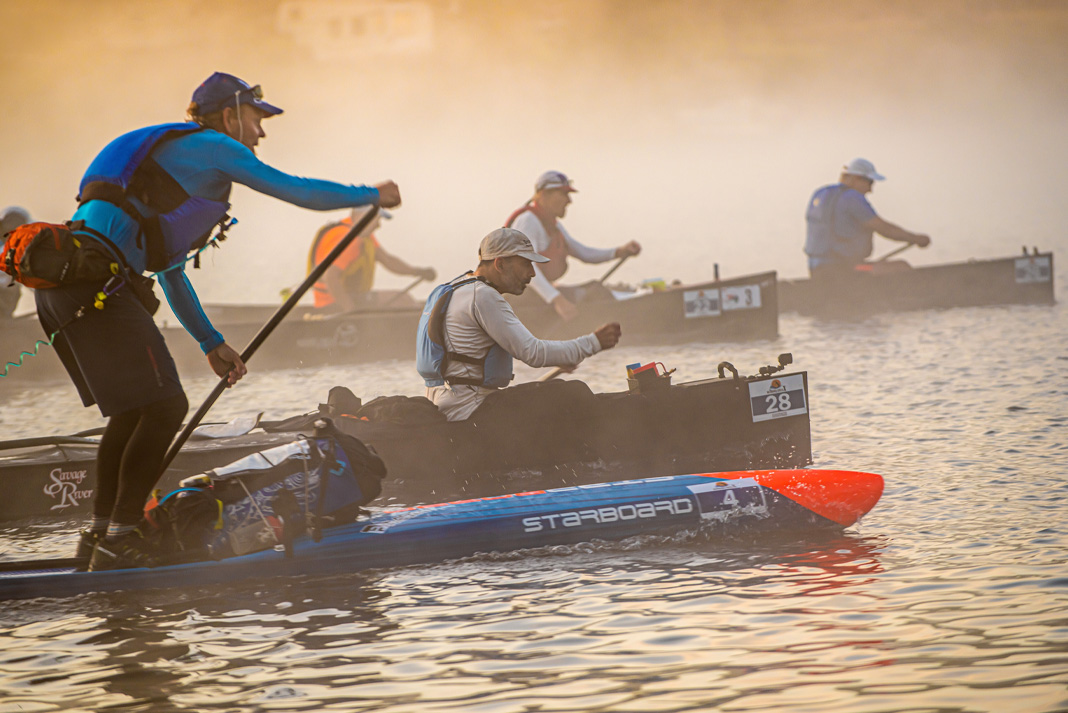

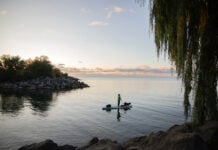
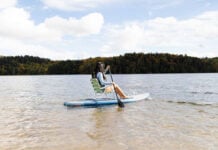
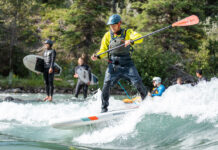
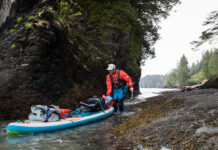

Hey happy to see this, would have gladly provided additional information/quotes if I knew….